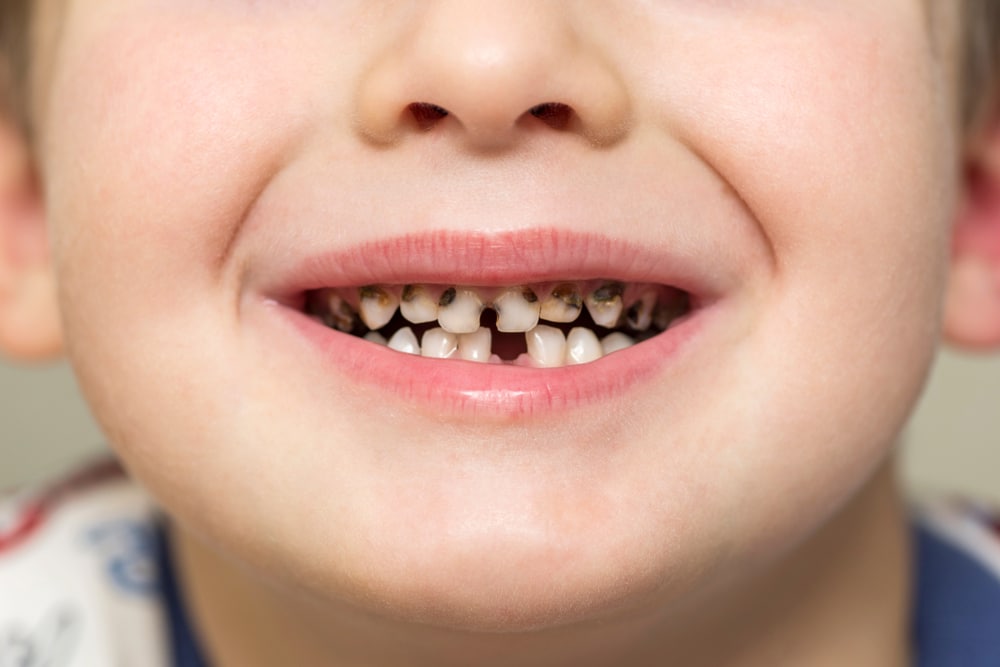
The fact that regular soda consumption is harmful to overall health and wellbeing is now well-known information. Regular consumption of soda is linked to a variety of negative health indicators, including increased cancer risk, higher likelihood of developing type II diabetes, poorer heart health, and many others. However, many people may forget or overlook the impact that soda consumption has on the teeth and mouth. The term “Mountain Dew Teeth” or “Mountain Dew Mouth” is something that is circulating in not only the dental community but the general population. While it sounds pretty straightforward, what are Mountain Dew teeth anyway, and how can this condition be prevented?
What Are Mountain Dew Teeth?
The term Mountain Dew teeth was coined by dentists who noticed this condition was common in people, oftentimes children and teenagers, who regularly consume sugar-sweetened beverages. This is a concern because soda continues to be a drink that wreaks havoc on teeth and overall health, and it is given to children at younger ages. Not only does Mountain Dew have high sugar content, but it also is highly acidic with a pH level of 3.3. The combination of acidity and sugar makes it very damaging for the health of the teeth and mouth.
What Causes Mountain Dew Teeth?
Very simply, Mountain Dew teeth are caused by the regular consumption of soda. After soda consumption, the sugar and acidity remain in the mouth, causing continuous damage. With the rise of new products and marketing geared towards children, the annual consumption of sugar-sweetened beverages is high in the United States.
Mountain Dew teeth, while it can affect people of all ages, is especially prevalent in children and adolescents. The reason being is because since children and teenagers are less informed about the impact of their decisions on their health and wellbeing, they may be more prone to consuming sugar-sweetened beverages regularly. Additionally, children and teenagers have teeth that are still developing. This may increase the harm that is done by consuming drinks that are highly acidic and sugary. While it is recommended to limit soda consumption, brushing and flossing after drinking soda is recommended. Making regular dentists’ appointments may also reduce the harm of soda on the teeth.
Treatment Options For Mountain Dew Teeth
If you do not already suffer from Mountain Dew teeth, it is wise to employ prevention strategies that may help you avoid the condition altogether. Symptoms like tooth decay or sensitivity, cavities, and staining of the teeth are certainly things that should be avoided at all costs. Here are a few healthy habits and strategies that you can try:
- Choose healthy drink options – water, milk, tea, and other low-sugar beverages are a smarter choice for both your body and your dental health.
- If you do consume soda, brush well afterward.
- Schedule regular cleanings. During busy times in life, it can be hard to remember to schedule a cleaning every 6 months. To avoid this, when you are at a dental cleaning you can schedule your next appointment while you are there.
- Maintain good oral hygiene habits by brushing and flossing at least twice per day.
If dental hygiene is not taken care of and the underlying problem of drinking too much soda is not addressed, tooth extraction and implants may have to occur in order to correct damage inflicted to the teeth and mouth. These procedures, while they do work for cosmetic purposes and can reduce risks of infections and other dental-related health issues, still do not address the problem of high soda consumption and poor dental habits. It is imperative that these habits are addressed in conjunction with any corrective dental procedures that may take place.